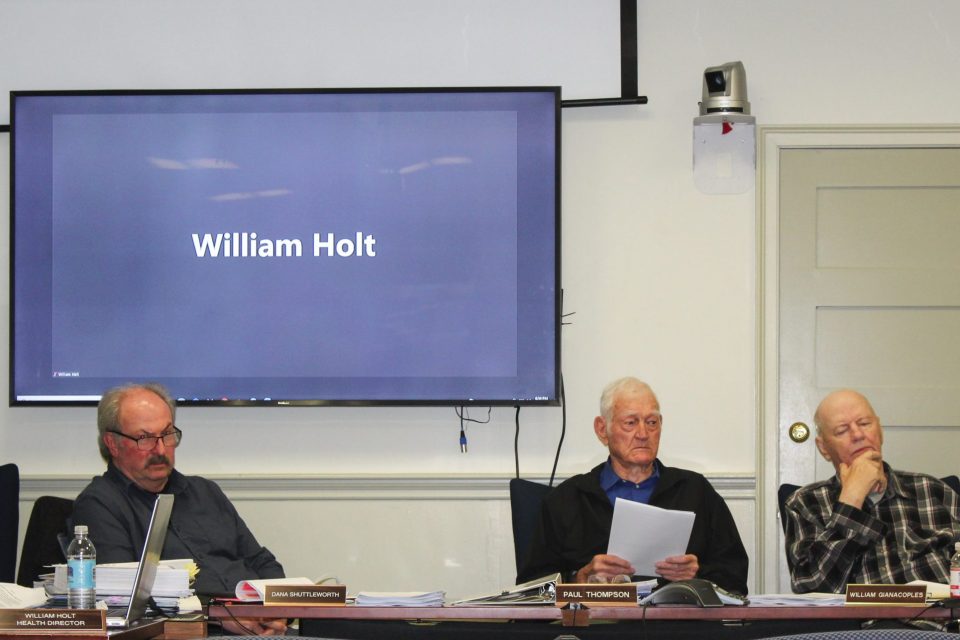GEORGETOWN – The town’s three-member Board of Health may approve this week the site on Carleton Drive for a proposed 550-ton trash transfer station, but it could make building and operating the station for G. Mello Disposal Corp. much more expensive.
The board may vote Thursday, May 12, on the transfer station, including the conditions it will impose. Two other town boards – the Planning Board and Conservation Commission – have already denied permits for the station.
Mello has appealed those decision against the station. Hearing officer John Shay, who presided over the Board of Health public hearings, said all boards would have to grant approvals for the station to be built and operating.
Jeff Blake, attorney for the health board, told the board members that the courts want it to approve the station under conditions that mitigate any harmful effects. “They want you to make it work,” he said.
Health Board Chairman Dana Shuttleworth proposed limiting the transfer station to 250 tons per day. When told by the board’s attorney Jeff Blake that there had not been enough evidence provided to the board to impose a 250-ton limit, the board suggested that Blake write a condition that would limit the station to 250 tons per day for the first two years.
To increase the tonnage in the third year, the health board would conduct a review of operations for the first two years.
Mello proposed that it begin operations for the first two years to 250 tons, then increase it by 100 tons each year until it reaches 550 tons.
In what may be the most costly condition, the board may require that Mello rebuild the 1,600-foot Carleton Drive to handle the increased volume of large tractor trailers and other trucks that will be using the station.
Based on the core sample analysis of the road substructure by Miller Engineering, the roadway, which is fraying on the edges, has a lot of sand and water beneath it.
A total rebuild of the road would require 20 inches of gravel as the base, topped with 12 more inches of crushed gravel, 3 inches of binding material and 2 inches of asphalt on top, Miller Engineering’s report said.
Mello proposed to repave the narrow road only to “town standards.”
The board was also concerned about the impact large tractor trailers and other trucks would have on the intersection of Carleton Road and state Highway 133 (East Main Street).
Shuttleworth asked that Blake write a condition that requires Mello to widen the road at the intersection with E. Main Street to accommodate large trucks turning from Rte. 133 onto Carleton Drive.
That proposal may not be possible because of protected wetlands on the east side of Carleton Drive.
The board agreed that Mello should try to mitigate congestion problems at the intersection by striping the road to indicate where vehicles should stop.
The board also insisted that Mello add signage on Carleton Road and on East Main Street, if MassDOT will allow it, that notifies motorists about trucks entering and exiting the intersection.
Mello proposed to hire a police detail for the first 60 days of operations to help with traffic flow at that intersection. The board wanted to make it 120 days and planned to ask the Georgetown Police Chief to issue a report on any problems with traffic incurred during the first 120 days. The board said it would then impose additional conditions on the station to remedy any traffic issues.
The board limited the large trucks using the station between 6 and 8 a.m. and for several hours in the afternoon, to be determined.
It also would require Mello to build a six-foot fence around the station to reduce the amount of litter from trucks. The trucks would be required to be covered coming and going from the station. If a truck driver is caught three times without covering the trash load, he would be banned from using the station for two months, the board said.
In the months after the station begins operations, the board would require several independent studies of noise, traffic congestion and odors. The board reserved the right to require more mitigation efforts by Mello if problems persist.




